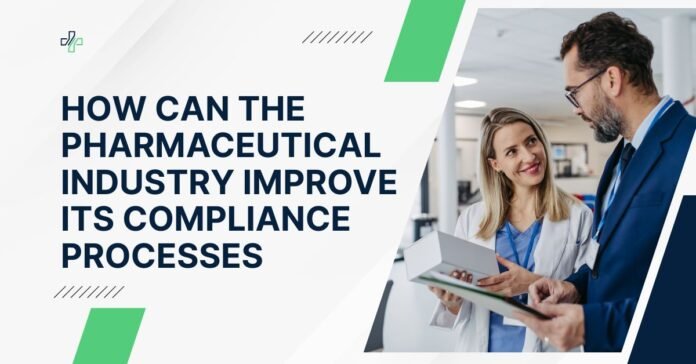Summary: Compliance in the pharmaceutical industry is a critical driver of long-term business success. By adhering to global regulations and implementing structured processes, companies reduce risks, enhance credibility, and streamline operations. Strategies such as using Pharma Compliance Management Software, standardizing procedures, training employees, managing risks, ensuring data integrity, and collaborating with regulators help organizations maintain robust compliance. Treating compliance as a strategic advantage enables pharma companies to innovate confidently, access new markets, and achieve sustainable growth in a highly regulated global environment.
Compliance in the pharmaceutical industry is more than just a regulatory requirement—it’s a safeguard for organizational reputation, product quality, and operational stability. With ever-evolving global regulations and rising scrutiny from authorities, pharma companies face significant challenges in maintaining compliance. FDA inspections surged from 15,443 in 2022 to 18,169 in 2023, a 17.6% increase (FDA and CPSC Enforcement Trends), while Health Canada initiated 436 potential non-compliance cases related to promotions between April 2024 and March 2025, resulting in 130 enforcement actions (Health Canada’s Cannabis Compliance Report). Strengthening compliance processes through technology, training, and proactive risk management is now essential for long-term success in this highly regulated industry.
What is Regulatory Compliance in Pharma?
Regulatory compliance in pharma refers to the strict adherence of pharmaceutical companies to laws, guidelines, and standards set by health authorities and regulatory bodies. These regulations cover every stage of the drug lifecycle—from research and development, clinical trials, manufacturing, labeling, and marketing to post-market surveillance. Agencies like the U.S. Food and Drug Administration (FDA), Health Canada, and the European Medicines Agency (EMA) ensure that medicines are safe, effective, and of high quality before reaching patients. Compliance also includes following international frameworks such as Good Manufacturing Practices (GMP), Good Clinical Practices (GCP), and Good Laboratory Practices (GLP).
Regulatory compliance means pharmaceutical companies must maintain rigorous documentation, conduct regular audits, and implement robust quality assurance systems. It also requires protecting patient data in line with privacy regulations like HIPAA and GDPR. Failure to comply can lead to severe consequences, including hefty fines, product recalls, license suspensions, or reputational damage. Beyond avoiding penalties, strong compliance ensures patient safety, builds trust with healthcare providers, and strengthens a company’s long-term position in a highly regulated global market.
What is the Purpose of Regulation in the Pharma Industry?
The purpose of regulation in the global pharmaceutical industry is to provide companies with a structured framework to ensure consistency, safety, and efficiency across all stages of drug development and distribution. By adhering to standards such as GMP, GCP, and international regulatory requirements, pharma companies reduce risks of non-compliance, avoid costly penalties, and strengthen credibility. Robust regulations also support sustainable operations, streamline approvals, and enhance competitiveness in an increasingly interconnected and highly regulated global market.
Key Strategies to Strengthen Compliance Processes
1. Adopt Advanced Compliance Management Software
Digital solutions are transforming how pharmaceutical companies manage compliance. By automating workflows, centralizing documentation, and enabling real-time monitoring, compliance software reduces the risk of human error and simplifies audit readiness. Tools like Pharma Compliance Management Software allow organizations to track regulatory requirements across multiple regions, generate accurate reports instantly, and maintain transparent records for inspections. This not only saves time and costs but also enhances accountability, helping companies stay consistently aligned with evolving global regulations
2. Standardize Policies and Procedures
A lack of standardized processes often leads to compliance gaps. Creating clear Standard Operating Procedures (SOPs) ensures that every department—from manufacturing to distribution—follows consistent practices. Regularly updating these SOPs in line with evolving regulations helps minimize confusion and prevents errors that could result in non-compliance. For pharma companies, standardized procedures also simplify training and improve organizational efficiency.
3. Strengthen Employee Training and Awareness
Employees play a critical role in compliance. Ongoing training programs tailored to specific roles, such as R&D staff, quality assurance teams, or sales representatives, help reinforce accountability. Training ensures employees are aware of regulatory updates, ethical guidelines, and data protection standards. A well-trained workforce reduces compliance risks and fosters a company-wide culture of integrity and responsibility.
4. Implement Robust Risk Management Frameworks
Risk management is essential for anticipating and preventing compliance failures. Regular audits, internal assessments, and predictive analytics can help companies identify potential weak points before they escalate. A structured risk management framework allows pharmaceutical organizations to monitor vulnerabilities, prioritize corrective actions, and demonstrate proactive compliance to regulators. This approach strengthens resilience and reduces the likelihood of costly penalties or recalls.
5. Enhance Data Integrity and Security
Pharma companies handle sensitive patient, clinical trial, and proprietary data that must be protected. Ensuring data accuracy, implementing access controls, and following international standards like GDPR or HIPAA are vital. Advanced tools such as blockchain and AI can add further transparency and traceability. Strong data integrity not only safeguards compliance but also builds confidence among regulators, stakeholders, and business partners.
6. Collaborate with Regulatory Authorities
Open communication with regulatory bodies helps pharmaceutical companies stay ahead of compliance changes. By engaging with Health Canada, the FDA, EMA, or other global authorities, businesses can gain early insights into evolving requirements. Proactive collaboration also demonstrates a commitment to compliance, fostering smoother approval processes and stronger regulator relationships. This partnership-driven approach reduces risks of unexpected compliance issues and ensures readiness for future regulations.
Compliance is the Cornerstone of Pharma Success
Compliance in the pharmaceutical industry is more than a regulatory checkbox. It is the backbone of long-term business success. Strong compliance practices not only protect companies from financial and reputational risks but also build credibility with regulators, investors, and global partners. By treating compliance as a strategic advantage, pharma organizations can innovate with confidence, expand into new markets more effectively, and secure sustainable growth while reinforcing trust across the broader healthcare ecosystem.



